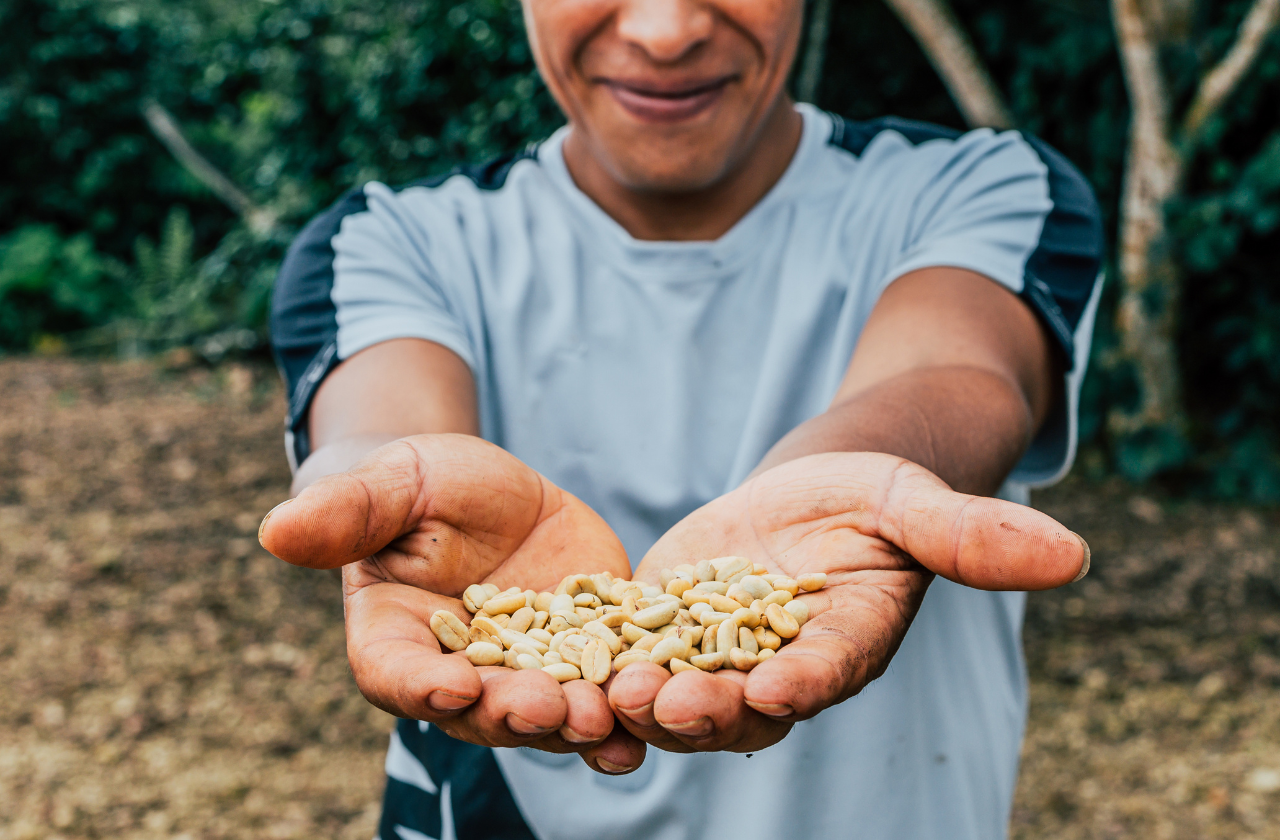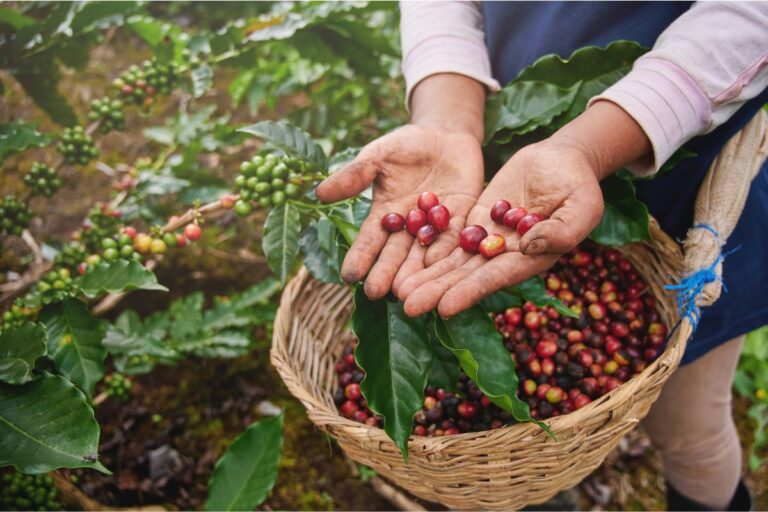Green Coffee Future: How Sustainability Is Transforming the Coffee Industry
The transformation of the coffee industry through sustainability into “green coffee” is not just a trend but a necessity for the industry to address growing global concerns. As one of the most consumed beverages globally, coffee plays a significant role in both the economy and the environment. Traditional methods of coffee production have raised concerns due to their environmental impact, including deforestation, water pollution, and high carbon emissions.
The coffee industry is witnessing a pivotal shift towards more sustainable “green coffee” practices. This shift is driven by a combination of environmental awareness, consumer demand for eco-friendly products, and the urgent need to adapt to the challenges posed by climate change.
The path towards a greener coffee industry is not without its challenges. Stay with us as we navigate through the obstacles and explore the potential solutions that will shape the future of sustainable coffee, and join us in the quest for a more responsible and eco-friendly cup of joe.
Key Takeaways
- Sustainable practices in coffee production, such as solar-powered roasting and carbon sequestration, are being implemented to reduce carbon emissions and protect the environment.
- Coffee companies are taking initiatives to support sustainability, such as recognizing and rewarding sustainable coffee growers, aiming for carbon neutrality, and promoting the use of compostable and recyclable materials.
- Collaboration and collective efforts are necessary to make the coffee industry more sustainable, and the next decade will be crucial in reshaping business practices.
- Environmental impacts in coffee production include deforestation, water contamination, wastewater generation, and vulnerability to climate change. Sustainable farming practices, fair trade certification, and ethical sourcing can help mitigate these impacts.
The Current State of the Coffee Industry

The global coffee industry is a complex and dynamic sector that significantly influences economies, societies, and the environment. This industry, valued in billions, is the livelihood for millions of people, especially in developing countries where the majority of coffee is produced.
Global Production and Consumption Patterns
Coffee is one of the world’s most widely consumed beverages, with a vast global market. The top coffee-producing countries include Brazil, Vietnam, Colombia, and Ethiopia, each with distinct growing conditions and production methods. Consumption patterns vary worldwide, with a notable increase in demand for specialty and premium coffee products.
Environmental and Social Challenges
Traditional coffee farming often involves practices that can be detrimental to the environment, such as deforestation, soil erosion, and water pollution from pesticides and fertilizers. Climate change poses a significant threat to coffee production, impacting crop yields and quality. Rising temperatures and changing precipitation patterns are affecting major coffee-growing regions.
Social issues are also prominent in the coffee industry. Many coffee farmers face economic challenges due to fluctuating market prices and often receive a small portion of the final retail price of coffee. This economic instability can lead to issues like poverty and inadequate working conditions.
Industry Response and Consumer Awareness
The industry is increasingly aware of these challenges and there is a growing movement towards adopting more sustainable and ethical practices. Consumers are becoming more conscious of the origins of their coffee and the impact of its production on the environment and local communities. This shift in consumer behavior is pushing brands and producers towards more transparent and sustainable practices.
The Role of Certifications and Standards
Certifications like Fair Trade, Rainforest Alliance, and Organic have gained prominence, reflecting a commitment to environmentally friendly and socially responsible coffee production. These certifications aim to ensure better prices for farmers, promote sustainable farming practices, and reduce environmental impact.
Technological Advancements and Innovations
Technology is playing a crucial role in transforming the coffee industry. Innovations in farming techniques, processing, and distribution are helping to reduce the environmental footprint and improve efficiency.
The journey towards a green coffee future is multifaceted, encompassing sustainable farming techniques, innovative technology in production, and a redefined market approach that values environmental stewardship alongside profit. This snapshot of the current state of the coffee industry sets the stage for understanding how sustainability is not just an option but a necessary evolution for the industry’s future.
Weird Coffee Tip: Organic coffee farming is a key to sustainable coffee. If coffee is not grown and cultivated in a self-sustaining way, it will not be around for future generations to enjoy, and the coffee industry will become nothing more than a commercial project. To learn more about organic coffee farming, check out this article:
Organic Coffee Farming Methods
Sustainable Practices in Coffee Roasting

Remarkable transformations are taking place in every corner of the coffee world, driven by a fierce commitment to environmental stewardship. From the moment the coffee beans are lovingly cultivated to the moment they reach your cup, sustainability is at the becoming the forefront of every decision and action.
Coffee companies are harnessing the power of the sun to roast their beans, and farmers are embracing innovative techniques to protect the land and preserve biodiversity.
When it comes to sustainable practices in coffee roasting, you have the power to make a positive impact on the environment and the future of coffee production. By supporting sustainable coffee production, we can ensure that our beloved beverage isn’t only delicious but also produced in a way that protects the planet.
One key aspect of sustainable coffee roasting is the use of renewable energy. By harnessing the power of the sun, we can achieve carbon-neutral roasting. Solar arrays and solar-powered roasting systems, such as the PuroSole and Bellwether, help reduce carbon emissions and decrease our reliance on fossil fuels.
These energy-efficient practices not only benefit the environment but also offer economic advantages by lowering electricity usage and costs.
In addition to renewable energy use, energy efficiency in coffee processing is crucial. By employing automated and electric roasting systems like the Bellwether, we can significantly reduce carbon emissions and volatile organic compounds (VOCs) associated with the roasting process.
This not only contributes to a healthier environment but also produces coffee with a cleaner, more consistent flavor profile.
To ensure that coffee is produced sustainably, certifications play a vital role. Look for sustainable coffee certifications such as Fair Trade, Rainforest Alliance, and Organic. These certifications guarantee that the coffee you enjoy has been grown and processed using environmentally friendly methods, fair wages have been paid to farmers, and ecosystems have been protected.
Sustainable Practices at the Farm Level

By taking sustainable coffee roasting practices to the next level, you can now explore the impact of sustainable practices at the farm level and contribute to the preservation of our planet.
Sustainable coffee farming is a crucial aspect of the coffee industry’s transformation towards a more environmentally friendly and socially responsible future. It encompasses renewable coffee practices, coffee supply chain sustainability, and organic coffee farming.
At the farm level, the adoption of sustainable practices is essential to mitigate the environmental impact of coffee production. Coffee farmers are particularly vulnerable to climate change and the resulting weather pattern changes that can negatively affect their crops.
However, with the implementation of sustainable farming techniques, such as agroforestry and shade-grown coffee, the coffee industry can reduce deforestation, promote biodiversity, and protect water sources.
Wonderstate, for example, works with Cooperative Coffees to build direct relationships with farmers and incentivize sustainable practices. Cooperative Coffees remunerates farmers who adopt carbon sequestration methods, ensuring that their efforts to mitigate climate change are recognized and rewarded.
Additionally, the use of tools like the Cool Farm Tool allows farmers to measure greenhouse gas emissions, biodiversity management, and water usage, providing valuable insights for further improvements.
To further promote sustainable practices at the farm level, Wonderstate is developing a system to pay farmers for their positive environmental impacts. This innovative approach not only supports farmers financially but also encourages them to prioritize sustainability in their farming practices.
As consumers, we have the power to support sustainable coffee farming by choosing brands that prioritize organic and fair trade coffee. By demanding transparency and ethical sourcing, we can drive change within the coffee industry and ensure that farmers receive fair prices for their crops.
Together, we can contribute to a more sustainable and equitable coffee supply chain, preserving our planet for future generations.
Sustainability Initiatives by Coffee Companies

Coffee companies are taking bold steps towards sustainability, implementing initiatives that prioritize the planet and the people behind every cup. These initiatives are transforming the green coffee industry and paving the way for a more eco-friendly and fair trade coffee practices.
Here are some of the sustainability initiatives being undertaken by coffee companies:
- Investing in Sustainable Coffee: Coffee companies are actively investing in sustainable coffee practices, supporting farmers who adopt environmentally friendly cultivation methods. This includes promoting organic farming, shade-grown coffee, and biodiversity management.
- Reducing Carbon Footprint: Coffee companies are striving to reduce their carbon footprint by implementing energy-efficient practices in their production and processing facilities. They’re also exploring renewable energy sources and participating in carbon offset programs to neutralize their emissions.
- Promoting Fair Trade: Many coffee companies are committed to fair trade coffee practices, ensuring that farmers receive fair prices for their crops. They work directly with farmers, building direct relationships, and providing them with the necessary resources and support to improve their livelihoods.
- Using Eco-Friendly Packaging: Coffee companies are adopting eco-friendly packaging materials, such as compostable and recyclable materials. They’re also implementing recycling programs to collect and recycle their packaging products, reducing waste and minimizing their environmental impact.
These sustainability initiatives by coffee companies aren’t only transforming the industry but also empowering the coffee farmers and protecting the environment.
Collaboration and the Future of Sustainability in the Coffee Industry
Collaboration holds the key to a thriving and sustainable future for the coffee industry, where environmental stewardship and social responsibility go hand in hand. It’s through collaboration that we can address the pressing issues facing coffee production and work towards a more sustainable and equitable industry.
By coming together, we can promote and implement practices such as agroforestry in coffee growing, which not only benefits the environment but also enhances the quality of the coffee beans. Shade-grown coffee, for example, provides habitat for birds and other wildlife, protects against soil erosion, and reduces the need for chemical inputs.
Furthermore, collaboration enables us to establish and uphold eco-certifications for coffee, ensuring that farmers adhere to sustainable practices and receive fair compensation for their efforts. These certifications not only protect the biodiversity of coffee-growing regions but also support local communities and contribute to the preservation of traditional farming methods.
In the face of climate change, collaboration is essential for developing and implementing climate-smart coffee agriculture. Through joint research and knowledge sharing, we can identify and adopt innovative techniques that help farmers mitigate the impacts of changing weather patterns on their crops.
This includes implementing efficient irrigation systems, promoting soil conservation practices, and investing in renewable energy sources to reduce carbon emissions.
Environmental Impact and Sustainable Practices in Coffee Production

The devastating environmental impact of coffee production demands urgent action and a commitment to sustainable practices. As coffee lovers, we’ve a responsibility to ensure that our favorite beverage is produced in a way that protects the planet.
Here are some key ways in which coffee production can be made more sustainable:
- Reducing the carbon footprint: Coffee production is a significant contributor to greenhouse gas emissions. By adopting sustainable farming techniques and methods, such as agroforestry and organic farming, we can minimize the carbon footprint in coffee production. These practices promote biodiversity, sequester carbon, and reduce the need for synthetic fertilizers and pesticides.
- Addressing climate change: Coffee is particularly vulnerable to the effects of climate change. Rising temperatures and changing weather patterns can lead to decreased crop yields and quality. By supporting initiatives that help farmers adapt to climate change, such as providing access to climate-resilient crops and promoting sustainable water management, we can safeguard the future of coffee production.
- Reducing waste: Coffee processing generates large amounts of waste, including coffee pulp, wastewater, and coffee grounds. By implementing innovative waste reduction strategies, such as composting coffee waste or using it for energy production, we can minimize the environmental impact of coffee production.
- Promoting fair trade and ethical sourcing: Sustainable coffee production goes beyond environmental considerations. It also involves ensuring that farmers receive fair prices for their crops and promoting ethical working conditions. By supporting brands that prioritize fair trade and ethical sourcing, we can contribute to the liberation of coffee-growing communities.
Together, we’ve the power to transform the coffee industry and make it more environmentally sustainable. Let’s demand transparency, support brands that prioritize sustainability, and make conscious choices that benefit both the planet and the people involved in coffee production. Liberation starts with our morning cup of coffee.
Frequently Asked Questions

What Are Some Innovative Sustainable Practices in Coffee Roasting?
Innovative sustainable practices in coffee roasting include using solar power to reduce emissions, employing electric roasting systems, and partnering with farmers who adopt sustainable methods. These practices promote environmental stewardship and create a more sustainable coffee industry.
How Do Coffee Companies Support Sustainability Initiatives?
Coffee companies support sustainability initiatives by implementing practices such as fair trade, ethical sourcing, and transparent supply chains. They prioritize compostable and recyclable packaging, promote the use of reusable cups, and invest in renewable energy. Together, we can create a more sustainable coffee industry.
What Role Does Collaboration Play in the Future of Sustainability in the Coffee Industry?
Collaboration is key to shaping a sustainable coffee industry. By working together, we can transform practices, protect the environment, and ensure fair treatment for farmers. Let’s unite for a future where coffee is sustainable for all.
How Does Coffee Production Impact the Environment, and What Sustainable Practices Can Mitigate These Effects?
Coffee production has a significant environmental impact. However, sustainable practices like shade-grown farming, fair trade certification, and water conservation can mitigate these effects. Choose brands that prioritize sustainability to make a positive change.
How Do Coffee Companies Address Social and Economic Sustainability at the Farm Level?
Coffee companies address social and economic sustainability at the farm level by working directly with farmers, providing fair prices, supporting sustainable practices, and investing in their livelihoods. Together, we can create a more equitable and thriving coffee industry.
Conclusion
Congratulations! You have embarked on a journey to discover how sustainability is revolutionizing the coffee industry.
Through the integration of sustainable practices at every level, from roasting to farming, coffee companies are leading the way towards a greener future.
By embracing solar-powered roasting systems and carbon sequestration initiatives, the industry is minimizing its environmental impact.
Collaboration and innovation are key to shaping the future of sustainability in coffee.
Let’s continue this mission to create a more responsible and environmentally conscious coffee industry for generations to come.
Together, we can make a difference!
-
Espresso Express eBook
R180,00 -
From Bean To Brew eBook
R450,00 -
Great Coffee, Made Simple
R0,00









